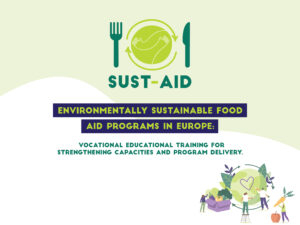Cáritas Coimbra is partner of a project that intends to improve the quality and sustainability of the food aid programmes
After the COVID-19 pandemic and the outbreak of war in Ukraine, Cáritas Coimbra, together with partners from four other countries, is confident that food aid programmes should be improved and should strive to be as sustainable to ensure equal access to healthy and high-quality food for all. Sustainability in food production and food aid chains is also important in the context of improving the environment and countering the climate crisis.
One of the main objectives of SUST-AID project which seeks to improve sustainability in food aid is to increase nutritional, green and management skills of staff and volunteers of food-aid programs. For this purpose, research was conducted with the group of staff and volunteers working in food-aid program. The main aims of research were to gain important insight into the needs of staff and volunteers operating in the area of food aid organization and delivery from the point of view of sustainable food aid. The results will be used to prepare a package of free trainings improving knowledge and competences among staff and volunteers working in food aid programs.
The study was conducted in 5 countries (Poland, Cyprus, Greece, Portugal, Austria) using the method of co-working sessions with 8-10 participants in each group. Results of research shows that most participants acknowledged the importance of sustainable food aid programs. As sustainability is multifaceted, a clear and unified definition as well as the main components of sustainable food aid programs need to be determined. Sustainability is important, not a priority though. Its’ application requires established procedures which are not always feasible in food aid. Sustainability elements can be embedded whenever possible. The importance of a systemic approach in relation to food production/food systems was also mentioned.
Major barriers have also been identified towards sustainability in food aid. Operational barriers were identified in relation to legal requirements, food supply chains, distribution logistics, resource separation and management and unpredictability of donations and need of support. These may also lead to inadequate food quantities, poor food quality and food waste. Additional barriers identified were miscommunication between producers and local organisations, lack of education and food literacy, lack of environmental sensitivity, lack of consideration of beneficiaries’ needs and preferences as well as lack of support from decision-makers and the state.
For more information regarding the SUST-AID project, please contact us at: office@farm-advisory.eu.
More information about SUST-AID can be found on the website https://en.caritascoimbra.pt/project/sust-aid/. This project is funded by the Erasmus+ Programme, KA220-VET – Cooperation Partnerships in vocational education and training, with Agreement Number 2021-2-PL01-KA220-VET-000048821.
